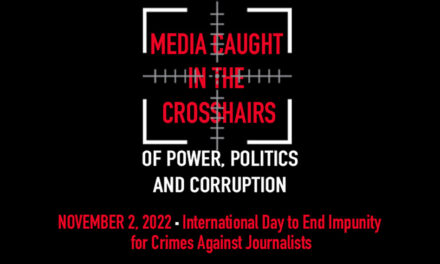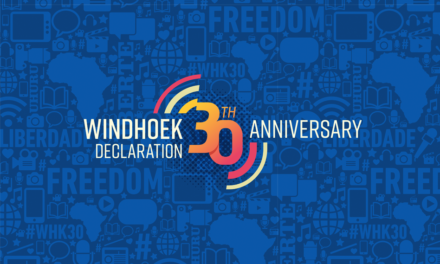
Fearless journalism under threat

Namibia’s emerging state surveillance regulatory environment could have the effect of stifling critical reporting and silencing society.
On a daily basis Namibian news audiences, especially of some daily newspapers, are presented with information emanating from anonymous sources or confidential informants.
Phrases such as ‘according to sources’ or ‘a source who spoke under the condition of anonymity’ regularly appear in politically charged or highly sensitive reporting of political or state governance affairs.
Corruption, governance malfeasance, waste and mismanagement in the state sector are almost always publicly surfaced through anonymous leaks of information or documents to journalists, or to some political activists.
However, new state surveillance enabling telecommunications regulations could have a chilling effect on such public interest leaks and reporting and thus the ability of the news media to continue to act as an effective watchdog over those in power.
This is because the new regulations – to operationalise Part 6 of the Communications Act of 2009 – gravely threaten to end anonymity in telecommunications.
This aim was clearly articulated in an official communique issued on 26 October 2021 by the Ministry of Information and Communication Technology (MICT) executive director, Mbeuta Ua-Ndjarakana, when he stated: “The benefits of SIM card registration is that it eradicates anonymity of communications, which aids in legal surveillance and interception. It also assists in finding criminals who utilise telecommunications to commit offences.”
To be clear, Namibia is on the cusp of operationalising SIM card registration and data retention regulations – that were gazetted on 15 March 2021 – that legalise mass surveillance, which will have a tremendous impact on Namibians’ rights to privacy and freedom of expression, as well as the directly related right to freedom of association.
With this move the Namibian state will, in the near future, become the latest African state to tie people’s online and communications activities to their offline identities in a way that would make identifying and tracking them easy.
And the potential impacts of these measures on Namibian news media and journalists are especially concerning.
Threatening journalism
Because what the new SIM card registration and data retention regulations install is a framework that effectively negates any notions of communication and internet privacy and confidentiality.
The level of mass surveillance that the impending Communications Act regulations will enable is so broad, extensive and invasive that every single person, in possession of an active mobile device or internet connection, will literally be followed around everywhere they go both offline and online.
The nature of this highly invasive mass surveillance became clear in the wake of a Communications Regulatory Authority of Namibia (CRAN) stakeholder ‘consultative’ process in October 2021.
What emerged publicly from this process were conditions to be imposed on telecommunications and internet service providers, that detailed the concerningly extensive amounts of cell phone and internet traffic data that service providers will be obligated to collect on every service user or consumer.
In practical terms the regulatory conditions mean that it will be near impossible for a journalist to maintain the secrecy of sources, or to set up confidential engagements or drops with sources. Similarly, the regulations could stoke the fear of surveillance among the general public, which could have the effect of silencing society for fear of being singled out for retaliation, thereby drying up journalistic sources of information of all kinds.
These are real concerns given the politicisation and factionalisation of law enforcement and intelligence agencies over the years, coupled with the almost complete lack of effective oversight over, and transparency and accountability of these state organs.
The near total undermining of communications and online privacy and anonymity is why the Namibian public interest law firm, the Legal Assistance Centre (LAC), labelled the emerging regulatory framework as “constitutionally faulty” in a policy brief published in early October 2021.
The LAC finds that the regulations are substantially weak in a number of critical ways that could enable surveillance overreach and abuse, such as a lack of “measures pertaining to the security of the data and protections for confidentiality and the prevention of unauthorised access”.
And the LAC concludes that “it seems likely that Namibia’s telecommunications data retention scheme might be found to be an unconstitutional infringement of the right to privacy overall, given the intrusion into the privacy of large segments of the population in a manner that has a questionable ability to serve the intended objectives”.
Debunking state narratives
The raising of these sorts of concerns has not deterred the Namibian state, as critiques of the constitutionality of Part 6 of the Communications Act have been around since before the law was enacted in 2009.
The Namibian state’s approach of course reflects the very narrow, single-track approach so beloved of states seeking to expand their surveillance powers and reach – trumpeting that such invasive measures are in the interest of effective crime fighting and protection of national security, as stated by the MICT executive director.
However, the evidence for mandatory SIM card registration and extensive data retention regimes being effective crime fighting or national security tools seems slim, according to international digital rights non-governmental organisation Privacy International (PI).
In this regard, PI states: “SIM registration has not been effective in curbing crime, but instead has fuelled it: states which have adopted SIM card registration have seen the growth of identity-related crime, and have witnessed black markets quickly pop up to service those wishing to remain anonymous. Moreover, SIMs can be illicitly cloned, or criminals can use foreign SIMs on roaming mode, or internet and satellite telephones, to circumvent SIM registration requirements.”
For its part, the Uganda-based Collaboration on International ICT Policy for East and Southern Africa (CIPESA) continues to report how African governments have been abusing similar regulations to clamp down on legitimate political expression, harass and arrest journalists, and spy on political opposition activists.
In its recently released ‘State of Internet Freedom in Africa 2021’ report CIPESA states that SIM card registration and data retention regimes across the continent have “greatly undermined the ability of citizens to communicate anonymously, given the amount of personal data that is collected, retained and shared through these exercises, without adequate oversight and respect for individuals’ privacy rights”.
Against this backdrop, red flags should be furiously fluttering and alarm bells clanging for Namibian journalists and news media organisations around the emerging state surveillance regulatory environment.










